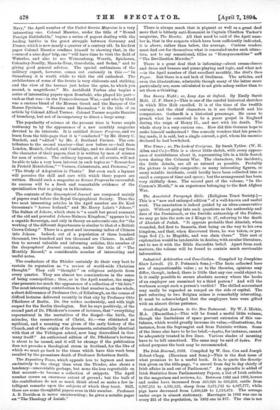The conductors of the Thinker certainly do their very best
to sustain its reputation as "a review of world-wide Christian thought." They cull " thought " on religious subjects from every quarter. They are almost too conscientious in the sense of being cosmopolitan ; thus, as in the April number, the maga- zine presents too much the appearance of a collection of "tit-bits."
The most interesting contribution to that number is, on the whole, a short deliverance of Professor Orr, of Edinburgh, on the course of
Gifford lectures delivered recently in that city by Professor Otto Pfleiderer of Berlin. Dr. Orr writes moderately, and with high respect for the Berlin theologian. But he says positively, of the second part of Dr. Pfleiderer's course of lectures, that "everything supernatural in the narratives of the Gospel—the birth, the miracles, the resurrection of Christ, &c.—was elithinated as mythical, and a meaning was given of the early history of the Church, and of the origin of its documents, substantially identical with that of the Tubingen school, now long discredited in Ger- many itself." An authorised edition of Dr. Pfleiderer's lectures is about to be issued, and it will be strange if the publication does not provoke a theological storm in Scotland, for the like of which we must go back to the times which have this week been recalled by the premature death of Professor Robertson Smith.
The Expository Times, which appeals less to laymen and more exclusively to the clergy than even the Thinker, also shows a
tendency—unavoidable perhaps, but none the less regrettable on that account--to become a collection of snippets. The April number covers an enormous extent of ground ; but the bulk of the contributors do not so much think aloud as make a few in- telligent remarks upon the subjects of which they treat. Still, there are some thoughtful papers even in this number. Professor A. B. Davidson is never uninteresting ; he gives a notable paper on "The Theology of Isaiah."






































 Previous page
Previous page